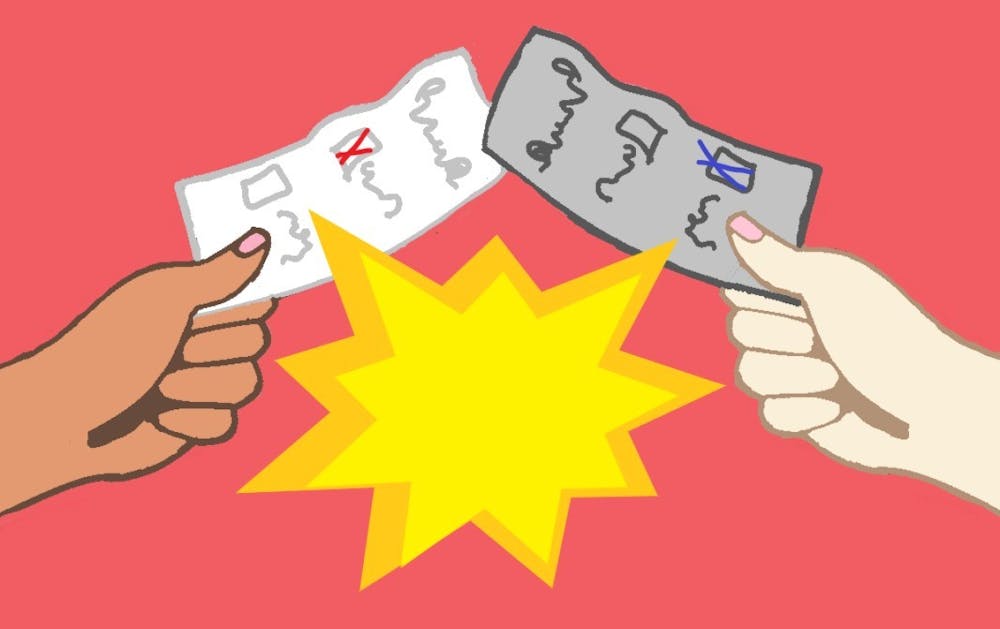Voters in Arizona and around the country once again proved that when presented with legislation directly, they will frequently vote more progressively than politicians.
However, ballot initiative processes are under attack, and people in Arizona and across the U.S. should defend their right to direct democracy as they use it to create progressive change. Across the country, propositions protecting abortion rights, voting rights and more passed with strong margins.
Abortion rights went 5-0 in a clean sweep of abortion-related propositions in the U.S. including wins in Kentucky, Michigan and Montana.
Missouri and Maryland voters legalized marijuana. Illinois voters enshrined collective bargaining in their constitution. South Dakotans expanded Medicaid. Nebraskans voted to gradually increase the state's minimum wage to $15. Michigan voters approved a strong voting rights package.
In Arizona, there were largely progressive results, with a few exceptions.
READ MORE: Here are the results for the propositions from the 2022 Arizona midterm elections
Arizonans voted against Proposition 128, which would have allowed the Legislature to amend ballot initiatives if any part of them were struck down by the state or the U.S. Supreme Court. However, Arizonans approved Prop. 129, which limits ballot measures to a single subject, and they also approved Prop. 132 which establishes a requirement for a supermajority vote on any ballot measure that creates new taxes.
READ MORE: Opinion: Arizona voters should oppose anti-democratic candidates and propositions
The latter two initiatives will make it harder to pass and establish ballot initiatives. The single-subject specification could open up legal challenges to approved initiatives.
On the bright side, Arizonans rejected Prop. 309 that would have created a requirement for a voter ID number and eliminated a two-document alternative to providing a photo ID for voting in person, among other restrictions. This proposition would have made it difficult or impossible to vote for many of Arizona's native voters, who have long used tribal ID cards without photos to vote.
Outside of voting and ballot initiative-related propositions, Arizonans voted yes on propositions 209 and 211. Prop. 209 reduces the interest rate on medical debt to no more than 3%, and it also increases the protected value of people’s primary homes and vehicles from debt collection.
"The best reforms are rooted in people's real needs. With the problems we've had with healthcare financing in this country over the last 20 years, and coupled with what's going on in the U.S. with inflation lately, post-pandemic, there was just a sense that this is a place we can make a difference in people’s lives," said Rodd McLeod, a spokesperson for Healthcare Rising Arizona, the organization that helped power Prop. 209 to success.
Prop. 211 creates more transparency in campaign finance by requiring entities that make campaign expenditures of more than $50,000 in statewide campaigns or $25,000 in other campaigns to disclose the names of the original sources of contributions over $5,000. This proposition leans into the voters' right to know when contributors are significantly investing in candidates.
"I think Americans generally feel like their politics (are) oligarchical, and I think there's a lot of evidence that our politics are in fact oligarchical," said Michael McQuarrie, the director of the Center for Work and Democracy at ASU. "So when you see an initiative that's designed to make politics more transparent, it's not a surprise that you would have a broad base of bipartisan support."
Both Props. 209 and 211 passed by over 70% of the vote.
Voters also narrowly approved Prop. 308, which will allow non-citizen residents of Arizona to qualify for in-state tuition at Arizona's state universities and colleges.
Voters disapproved of Prop. 310, which would have created a one-tenth of one penny sales tax increase to better fund fire districts, particularly those in rural areas.
In terms of the initiatives discussed, Arizonans voted 5-3 in favor of progressive initiatives. Yet, it is possible the Legislature will be fully controlled by the GOP.
"Electoral politics or representatives basically magnifies divisions on a few discrete issues and is not usually very good at responding to what’s needed or what citizens want," McQuarrie said.
Given that voters often vote against the interests of politicians through ballot propositions, it is no surprise some politicians are attacking the proposition method of creating change.
According to a report from the ASU Center for Work and Democracy about ballot initiatives, economically redistributive initiatives win more than 75% of the time in both conservative and liberal states.
However, there are real limits to how much structural change can happen through the ballot initiative process, but organizers can influence who votes and at what rates they vote.
"What we did this year is we really targeted young people and people of color. The way we did this is we provided education and resources, and we let people know what was on the ballot this year and what was at stake," said Araceli Villezcas, spokesperson for One Arizona.
One Arizona is a nonprofit organization that works to improve the lives of Arizonans through civic participation, and a great example of fighting to create change for working people. It sits alongside unions and other forms of organizations such as Healthcare Rising Arizona, which according to McQuarrie, is an "excellent" example of "thinking more broadly about the ecology of working people’s organizations."
The ballot proposition has clearly made its mark as a powerful tool for working people to wield in order to create progressive change. ASU students, Arizonans and voters in the U.S. should fight to defend their right to the ballot initiative process, while building and utilizing other forms of power for working people.
Edited by Sadie Buggle, Wyatt Myskow and Piper Hansen.
Reach the columnist at astigile@asu.edu and follow @StigileAaron on Twitter.
Editor's note: The opinions presented in this column are the author's and do not imply any endorsement from The State Press or its editors.
Want to join the conversation? Send an email to opiniondesk.statepress@gmail.com. Keep letters under 500 words and be sure to include your university affiliation. Anonymity will not be granted.
Like The State Press on Facebook and follow @statepress on Twitter.

Aaron Stigile is an opinion columnist at The State Press. He previously wrote for The Defiant Movement and is working toward a bachelor’s degree in Journalism and Mass Communication. He is also working toward a minor in Spanish and a certificate in Cross-Sector Leadership.




